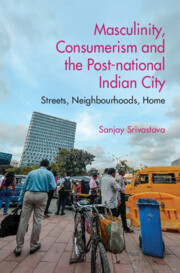Book contents
- Frontmatter
- Dedication
- Contents
- List of Figures
- Acknowledgements
- 1 Introduction: Masculinity, Modernity, Urbanity
- 2 Nationalism, Masculinity and the City
- 3 Dislocated Masculinities and the Unofficial City
- 4 Thrilling Affects: Sexuality, Masculinity, the City and ‘Indian Traditions’ in the Contemporary Hindi ‘Detective’ Novel
- 5 Fragmentary Pleasures: Masculinity, Urban Spaces and the Commodity Politics of ‘Religious Fundamentalists’
- 6 Technotopias: Masculinity, Women, the City and the Post-national Condition
- 7 Conclusion: Masculine Body Politics
- Bibliography
- Index
5 - Fragmentary Pleasures: Masculinity, Urban Spaces and the Commodity Politics of ‘Religious Fundamentalists’
Published online by Cambridge University Press: 06 September 2022
- Frontmatter
- Dedication
- Contents
- List of Figures
- Acknowledgements
- 1 Introduction: Masculinity, Modernity, Urbanity
- 2 Nationalism, Masculinity and the City
- 3 Dislocated Masculinities and the Unofficial City
- 4 Thrilling Affects: Sexuality, Masculinity, the City and ‘Indian Traditions’ in the Contemporary Hindi ‘Detective’ Novel
- 5 Fragmentary Pleasures: Masculinity, Urban Spaces and the Commodity Politics of ‘Religious Fundamentalists’
- 6 Technotopias: Masculinity, Women, the City and the Post-national Condition
- 7 Conclusion: Masculine Body Politics
- Bibliography
- Index
Summary
Introduction
This chapter brings together three themes that have been significant throughout the earlier ones – masculinity, urban spaces and consumer culture – to explore the lives of a group of young men who belong to the Bajrang Dal, the all-male organisation of the Hindu right with strong roots in north India. The chapter focuses upon relationships between self-avowed religious and masculine identities to both explore the manner in which the city acts as a template and is shaped by them. The spectacular rise of a Hindu religious consciousness in the Indian public sphere over the past decade is a significant context as far as the Indian present is concerned and has received a great deal of scholarly attention (for example, Basu et al. 1993; Bhatt 2001; Bacchetta 2004; Chakraborty 2011; Anderson and Longkumer 2021). This chapter is not, however, an exploration of men of the religious right and their attitudes towards their putative enemies. Rather, it explores the different ways in which the lives of the so-called religious fundamentalists connect with the processes of contemporary capitalism to produce specific senses of non-middle-class masculine identities. In particular, the chapter investigates the ways in which urban masculine identities are constructed through strategies of the fragmented – or split – self. It suggests that the fragmentary politics of the self is a useful tool for understanding both expressions of male power and its articulation with contemporary consumer culture. In this way, the chapter suggests that the nature of the city – as a site of fragmented spaces and relationships – leads to specific responses in the way that urban masculinities are constructed.
To explore urban ‘Hindu masculinities’, the chapter engages with those perspectives on Hindu nationalism that take up the central role of the masculine identity of its protagonists and primarily view religious violence as an attempt to regain a ‘whole’ and ‘pure’ self, and a desire to return to an ‘uncontaminated’ past. My argument builds upon theorisations of gender and Hindu nationalism, space and subjectivity, and identity politics in an age of intense and voluminous transnational flows.
- Type
- Chapter
- Information
- Masculinity, Consumerism and the Post-National Indian CityStreets, Neighbourhoods, Home, pp. 105 - 129Publisher: Cambridge University PressPrint publication year: 2023



